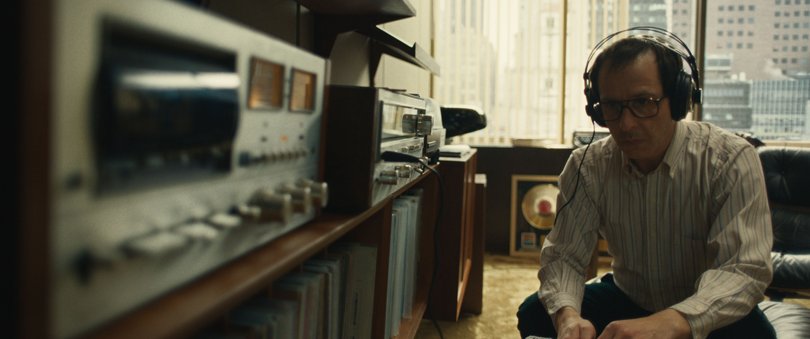Springsteen: Deliver Me From Nowhere has the problem that Jeremy Allen White is too good elsewhere
Jeremy Allen White’s performance is the best thing about an otherwise middling movie, but the problem is he’s too good elsewhere.

Nebraska was the Bruce Springsteen record his label did not want.
The Boss had just come off a massive tour for The River with 140 shows across the US and 10 other countries, a mix of tracks from the album and previous hits including the banger Born to Run.
Springsteen had momentum and the record company was keen to keep that going with another high-octane release. Instead, they got a lo-fi, almost-folk album recorded on tape in the bedroom of a house in New Jersey.
Sign up to The Nightly's newsletters.
Get the first look at the digital newspaper, curated daily stories and breaking headlines delivered to your inbox.
By continuing you agree to our Terms and Privacy Policy.The label, represented on screen in Springsteen: Deliver Me From Nowhere, by David Krumholtz as Columbia executive Al Teller, was baffled, especially when the accompanying rules are laid out: no tour, no press, and not even his photo on the cover.
Nebraska was still a big success and, over time, has come to be regarded as one of Springsteen’s finest artistic moments, full of thoughtful and vulnerable songwriting featuring stories of the American working class, connecting to an older musical tradition than radio pop hits.
But where did Nebraska come from? Why did Springsteen take such a left turn when he was on a roll?

Those are the questions writer and director Scott Cooper wants to answer with Springsteen: Deliver Me From Nowhere, adapted from the book by Warren Zanes.
It’s not a conventional life- and career-spanning biopic. It’s interested in this very specific moment in Bruce’s journey, from late 1981 to 1982, as he was coming off the high of The River tour, retreating to a rented lakeside home in Colts Neck, a 10-minute drive from his childhood home in Freehold.
That geographical closeness is key to what’s happening with Bruce (Jeremy Allen White) as he self-isolates and regresses into memories of his childhood with his volatile father (Stephen Graham) and mother (Gaby Hoffmann).
The film connects his present malaise and restlessness with that time in his life, which ends up fuelling his songwriting and musical experimentation.
The recollections of his father’s struggles, which manifested in abusive behaviour at home, forces Bruce into an emotional reckoning.
Coming across on TV Terrence Malick’s 1973 directorial debut, Badlands, starring Martin Sheen and Sissy Spacek, about murderer Charles Starkweather, also sparks inspiration.

The only people seemingly allowed into Bruce’s process are Mike Batlan (Paul Walter Hauser), the lone sound engineer who helped with the intimate recording, and Jon Landau (Jeremy Strong), his loyal manager and producer.
There’s a romantic subplot with a character named Faye Romano (Odessa Young), an amalgam of Springsteen’s fleeting love interests at the time, but Bruce keeps her at a distance, unable to really give any part of himself.
The word that isn’t being said for most of the film is “depression”, even though there are exposition dumps of Jon explaining Bruce’s emotional state to his wife (Grace Gummer, who is only asked to give a concerned, listening face), the audience surrogate.
Cooper is at pains to spell it out for the viewers, and it’s one of the more frustrating aspects of the film. It’s as if he or the producers or the studio didn’t have the confidence that the audience would get that’s what was happening, just because Bruce hasn’t been loquacious about it at every turn.
The character doesn’t need to be because White’s performance says it all. Even with brown contact lenses on over his usually blue eyes, White is prodigious at conveying everything with a look, a gesture, his physicality.

But here’s the rub, and it’s an unfair but unavoidable one.
Taken completely on its own, White’s performance is a powerful and often quiet one that expresses the gravity of his turmoil.
It’s a performance that would floor you if you hadn’t already seen him play brooding, depressed interiority for four years on The Bear as Carmy. It’s difficult to separate the two because White’s talent on that show has been so dominant in the culture.
He’s doing something different, but it is still almost impossible not to make comparisons between these two characters he plays that are both devoted — to a fault — to creation and artistry, who have unresolved family issues, and who become involved with women they can’t be available for.
It’s a strange problem for Springsteen: Deliver Me From Nowhere, in that White is too good elsewhere to be a real revelation here. Without The Bear, White’s performance might be getting the kind of reactions he got for the first season of that streaming series.
His performance is the best thing about the film which is otherwise a middle-of-the-road biopic with good intentions that ultimately fails to match the legacy of an incredible album and artist.
Still, it’ll drive you to play Nebraska on repeat, and that’s not a bad thing.
Rating: 3/5
Springsteen: Deliver Me From Nowhere is in cinemas

